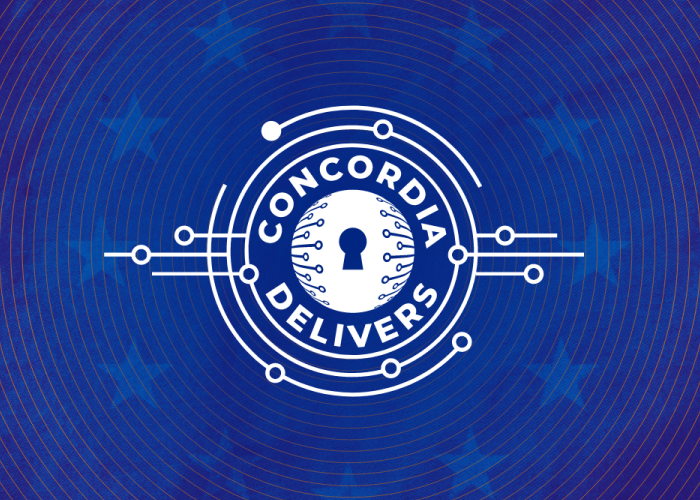CONCORDIA project ends. It delivered 21 results to strengthen European cybersecurity
– 56 institutions from 21 countries across Europe collaborated on the research and innovation project
More than 21 outcomes, over 300 scientific publications, a multi-stakeholder ecosystem bringing together stakeholders from research, industry, start-ups and public bodies: all this and more was achieved by the European CONCORDIA project, which ended on 31st March. The four-year, €16-million project (plus €7 million of industrial funding) covered a wide range of topics, including cyberattacks on critical infrastructure, information security and data protection, certification, and competence building.
“Multiple crises such as the pandemic, the war in Ukraine, and climate and energy crises underline the increasing importance of building a secure, trusted and resilient digitally sovereign Europe,” said project coordinator Professor Gabi Dreo from the University of the Bundeswehr Munich.
“CONCORDIA has fully achieved its objective of building such an ecosystem, being agile, innovative and open. CONCORDIA’s results will not only provide valuable input to the European Cybersecurity Competence Centre and the network of National Cybersecurity Centres, and with this to the whole European cybersecurity community, but they will also work to strengthen and speed up research, development, and especially innovation.”
The CONCORDIA project delivers 21 outcomes to help counter the rapidly growing number of complex cyberattacks and the increasing threat landscape. They are divided into six main categories: Policy, Technology Tools, Education, Technology Pilots, and Certification and Research. All the results are now available to the public on the project website.
One of the outputs is a set of strategic recommendations for cybersecurity in Europe published under the title Roadmap for Cybersecurity in Europe. It links various areas such as research and innovation, education, economics and investment, law, and certification and standardization in a holistic way. So far, interest has focused mainly on research and development aspects of cybersecurity. The new strategy document describes nine fundamental dimensions that affect cybersecurity, showing where the current focus should be. A CONCORDIA Monitoring Board has been developed for the continuous gathering of feedback from the cybersecurity community.
Other tools include the KYPO Cyber Range Platform, which Masaryk University developed and, thanks to the project, released as open source in 2020.
“We believe the KYPO Cyber Range Platform is a significant contribution to the cybersecurity community. The open-source cyber range makes hands-on cybersecurity education widely available to universities and organizations in Europe and worldwide,” said Jakub Čegan, the head of cybersecurity exercises at Masaryk University.
“This activity aims to address the great lack of cybersecurity experts by providing a platform for the development and execution of cybersecurity training and exercises.” The KYPO Cyber Range was awarded the 2021 EC Innovation Radar competition in the Disruptive Tech category.
Defence against DDoS attacks is addressed by another of the project’s tools – the DDoS Clearing House, piloted in Italy and the Netherlands. Sharing data and the experience of experts in the face of attacks helps organizations find out what attacks exist so they can prepare for them in advance. Developing Cyber Threat Intelligence platforms for the telco and finance sectors are other examples of the project’s achievements.
The CONCORDIA project (Cyber security cOmpeteNCe fOr Research anD Innovation) links the technical and social sciences and involves 56 institutions from across the EU, including universities, research centres, private companies and public bodies from 17 EU member states, Switzerland, Norway, Israel and the UK. It is coordinated by the University of the Bundeswehr Munich. The project is funded by the European Union to an amount of almost 16 million euros. The project started on 1st January 2019 and ended on 31st March 2023.
The CONCORDIA project has received funding from the European Union’s Horizon 2020 Research and Innovation Programme under Grant Agreement No 830927.

